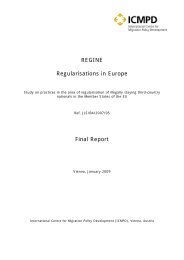taxud/2414/08 - European Commission - Europa
taxud/2414/08 - European Commission - Europa
taxud/2414/08 - European Commission - Europa
Create successful ePaper yourself
Turn your PDF publications into a flip-book with our unique Google optimized e-Paper software.
Prepaid card services cover scenarios where the card holder spends money which has<br />
been "stored" via a prior uploading of the card by the card-holder or someone else; such<br />
card services do not provide for a lending of money.<br />
3. There is the issue of "time to pay/ deferment of payments" which is not explicitly<br />
resolved by the provisions of the Regulation and which has been discussed with Member<br />
States for verifying how the rules are to be applied. Usually such services are part of the<br />
price paid for the supply of goods or services. It is for that reason that Article 135 (1c) of<br />
the draft Directive provides for that where the supply of goods or services includes the<br />
granting of credit which is not set out separately, the grant of credit shall not be a distinct<br />
service exempted under Article 135 (1) (b) of the draft Directive.<br />
However, in scenarios where such time to pay/ deferment of payments is not accessory to<br />
another supply but a separate and distinct service on its own, it could in the view of DG<br />
Taxud represent the lending of money even if this lending only consists in the debtor<br />
being able to keep his own money for the agreed period.<br />
(dd) guaranteeing of debts<br />
Under Article 135a (3) of Directive 2006/112/EC "guaranteeing of debts" means the<br />
acceptance of liability for the debt of another person. This provision is complemented by<br />
Article 4 of the Regulation which provides for the following:<br />
1. The definition of the "guaranteeing of debts" provided for in point (3) of<br />
Article 135a of Directive 2006/112/EC shall cover the provision of at least the<br />
following 13 :<br />
(a) credit default swaps;<br />
Credit default swaps have the effect of transferring the credit exposure of credits between<br />
parties. It is an agreement between a protection buyer and a protection seller whereby the<br />
buyer pays a periodic fee in return for a contingent payment by the seller upon a credit<br />
happening in the reference entity. Most CDS contracts are physically settled, where upon<br />
a credit event the protection seller must pay the par amount of the contract against the<br />
protection buyer's obligation to deliver a bond or loan of the name against which<br />
protection is being sold. The typical term of a CDS contract is five years, although being<br />
an over-the-counter derivative almost any maturity is possible. Against this background a<br />
CDS is a typical financial instrument for the guaranteeing of debts;<br />
(b)<br />
customs bonds.<br />
Customs bonds represent a guarantee for credited customs duties and taxes in default;<br />
2. The definition of the "guaranteeing of debts" provided for in point (3) of<br />
Article 135a of Directive 2006/112/EC shall not cover the following:<br />
13 Financial futures, options and interest swaps are dealt with in Article 19 of the Regulation<br />
23
















